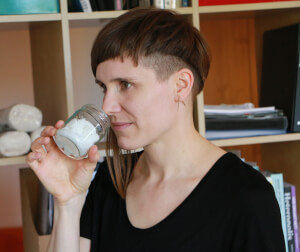I propose to discuss my series of works that explore the aesthetic and political potential of the peoples’ body scents. I will focus on the following two points: a) how my work intends to contribute to social change by tackling issues related to the social taboos of peoples’ body scents b) how my practice can elevate the position of smell in the study of aesthetics.
My talk will address the following elements:
- Contextualization
1.1) I will expose how I situate my work at the intersections of art, science and the humanities and elaborate on the established literature engaging with body scents. Moreover, I will outline my main source of inspiration for exploring the perception of body scents.
1.2) I will explain my working method as a process of research-creation, through which I combine artistic experimentation and scholarly investigation in order to produce knowledge.
1.3) I will elaborate on how I use the term “body scents” and what role it plays in my work. When employing the term “body scents”, I refer to how a person smells. I have chosen to use this term to have a value-neutral connotation that promotes a sense of curiosity. Contrarily, the term body odor commonly is associated with particular social taboos related to smell, and it is often used to express a judgment.
2) The political and aesthetic potential of body scents
2.1) I will outline my work’s central thesis—the perception of body scents is a political act. My idea has been inspired by philosopher Alva Noë’s, who argues that [“p]erception is not something that happens to us, or in us [but] is something we do” (Noë 2004 p. 1). I strive to implement Noë’s idea about agency over our perception in my work to explore the following two questions:
- Can a sense of agency about one’s perceptual judgment and social bias towards another’s body scents contribute to undoing the marginalization about people’s smell?
- What are the culturally sensitive methods that can be designed to foster an awareness about the perception of others’ body scents?
2.2) I will demonstrate how my practice serves as the basis for me to form a new aesthetic approach to smell. In so doing, I will both give a brief overview and challenge the ways that the sense of smell has been repressed in modern aesthetics.
2.3) I will explain how my work strives to critically engage with the experimental limitations present in the laboratory practices exploring human olfactory (smell) systems from a feminist perspective. This critical engagement has been informed by Donna Haraway’s reflection on issues surrounding objectivity and reductionism, as articulated through her feminist exploration of ‘situated knowledge’(Haraway 1988).
In my talk, I will demonstrate the crucial role that our perceptual judgment of body scents plays in our social experiences. My use of the political potential of body scents both intends to contribute to overcoming the social taboo around peoples’ smells and elevates the role of the sense of smell in aesthetics.
References:
Haraway, D 1988, ‘Situated Knowledges: The Science Question in Feminism and the Privilege of Partial Perspective’, Feminist Studies, vol. 14, no. 3, pp. 575-599.
Noë, A 2004, Action in perception, MIT Press, Cambridge (MA) & London (UK).
Back






